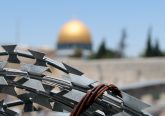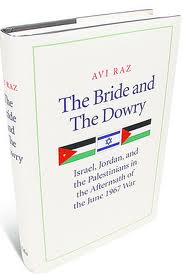 In recent years we have seen the publication of a series of Palestinian life stories including, among others, the ‘Incomplete Autobiography’ of Yusif Sayigh (2009) and the autobiography of Shafiq al-Hout (2007). The subject of this review is also found within this series; the autobiography of Anis Sayegh, entitled Anis Sayegh ‘n Anis Sayegh, which was released in Beirut by Riad El Rayyes in 2006. The autobiography of Anis Sayegh describes his life from early childhood in the 1930s to the early 2000s. It consists of nine chapters.
In recent years we have seen the publication of a series of Palestinian life stories including, among others, the ‘Incomplete Autobiography’ of Yusif Sayigh (2009) and the autobiography of Shafiq al-Hout (2007). The subject of this review is also found within this series; the autobiography of Anis Sayegh, entitled Anis Sayegh ‘n Anis Sayegh, which was released in Beirut by Riad El Rayyes in 2006. The autobiography of Anis Sayegh describes his life from early childhood in the 1930s to the early 2000s. It consists of nine chapters.
In the first chapter we learn that Anis Sayegh was born in November 1931 in Tiberias, the youngest of seven children in a traditional Protestant Christian extended family. His father originally came from Syria and worked as a pastor. He also presents a short biography of his parents and his six siblings, Yusif, Fowad, Fayez, Tawfiq, Mary and Munir, and describes his relationship with most of them. Anis Sayegh notes, too, that after 1948 he had to stay away from home, an early and very painful experience with which he never came to terms.
The focus of the second chapter is not just Anis Sayegh’s autobiographical narrative, but also the description of relevant historical information about Tiberias and al-Bassa (the birthplace of his mother). Sayegh’s description of these two places, wh˙e˙re he spent his youth, is characterised by his memories of relatives and acquaintances and by Lake Tiberias, as well as Christian and Islamic monuments.
Chapter 3 provides us with an insight into his schooling and study, as well as teaching activities (1939 – 1964). Anis Sayegh attended primary school in Tiberias and high school in Jerusalem, although, in 1947 after the riots in Palestine, which were in reaction to the United Nations Partition Plan for Palestine, he had to move to Lebanon in order to complete his high school education. The day he left Palestine and moved to Lebanon was for him both terrifying and unforgettable. Not only because his mother was admitted to hospital on this day, but because he was never afterwards allowed to return to Palestine.
Thereafter, he began to study Political Science and International Relations at the American University of Beirut (AUB), where he graduated in 1953. Some years later, he produced his Ph.D. dissertation entitled al-Fikr al-Qawm¯ı f¯ı Masr f¯ı al-Qarn al-Tasi‘ ‘ashr [Pan-Arab Thought in Egypt during the 19th Century˙] at the University of Cambridge, where he served as a lecturer in oriental studies.
Chapter 5 discusses his activities at the Research Center of the Palestine Liberation Organisation (PLO) and the supervisory board of the Palestinian Encyclopedia, while Chapter 6 describes his relationship with Yasir Arafat, the former PLO chairman. Shortly after his return to Lebanon, Anis Sayegh was appointed General Director of the PRC (1966 – 1976/1977), which had been established some years earlier by his brother Fayez Sayegh. Anis Sayegh expanded the research centre (PRC) and recruited many Arab and Palestinian authors and writers such as Sadik J. Al-Azm and Mahmoud Darwish.
The research centre (along with the Institute for Palestine Studies) dominated the Palestinian intellectual arena during the 1970s. It was dedicated to documenting and preserving the history of the Palestinians and making their narrative known. It focused on the reconstruction of Palestinian history in the pre-1948 period as well as the recording of contemporary information about the Palestinian refugees and the rise of the Palestinian revolutionary movement. Furthermore, the PRC focused on Israeli studies, a topic that had previously been taboo in the Arab world. One of its main achievements was the collection of archival documents and autobiographies, which had previously been absent from the canon of Palestinian literature. In addition, the PRC distributed the monthly journal Palestine Affairs, which served as a platform for Arab and Palestinian writers to pursue innovative articles. The PRC also hosted a library, which began to attract many regional and international researchers.
Anis Sayegh’s biography is of great importance because it sheds light on the closed world between the intellectuals and socio-cultural institutions on the one hand, and the politicians and political authority on the other hand, and thus enables us to deduce their history, despite Anis Sayegh’s insistence that his description is a subjective experience of his own. According to the author, Yasir Arafat considered intellectuals and the socio-cultural institutions as henchmen of his party (Fatah) and supporters of his own political interests, whereas Anis Sayegh, as General Director of the Research Center, refused any political relationship of subordination. Consequently, at the PRC, he fought strongly against factional loyalties and nepotism.
His particular way of working and dedication to the modern scientific method did not always go down well with all the centre’s employees, and his political independence resulted in a state of disharmony, alienation and rivalry with political actors, which prompted him to submit his resignation in 1977.
Sayegh speaks about his party affiliation in Chapter 7. We learn that he, like his brothers Jusif and Fayez, belonged to the Syrian Social Nationalist Party. After the rise of Gamal Abdel Nasser, he clung to his ideology, a fact that is reflected in his publications, ‘The Pan-Arab Idea in Egypt’ (al-Fikr al-‘Arab¯ı f¯ı Masr) and ‘The Development of the Pan-Arab Concept under Arabs’ (tatawur al-M˙afhum al-Qawm¯ı ‘ind al-‘Arab). Anis Sayegh remained loyal to Arabis˙m until his death, and did not join any national party after the rise of Palestinism in the 1960s. It is likely, however, that he was disposed to leftist currents. He saw himself as a Palestinian Arab, whose local patriotism melted harmoniously into pan-Arabism (see pp. 12, 183 – 184).
In recent years, Anis Sayegh has published numerous articles in various newspapers (e.g., al-Hayat, al-Nahar and as-Safir) and magazines, and published several scientific and political books on historical and public affairs. His regional importance is due to his establishing a number of Arabic journals, which are worth mentioning at this point—Palestine Affairs (shw’wn filist¯ıniyya, 1971 – 1977), Arab Future (al-Mustaqbal al-‘Arab¯ı, 1978 – 1979), A˙rab Affairs (shw‘wn ‘arabiyya, 1981 – 1982)—and by his directorship of Arab Issues (Qada¯ ya¯ ‘arabiyya, 1979 – 1981) (Chapter 4).
After 1978, as a member of the Supervisory Board of the Palestinian Encyclopedia and subsequently as Chairman of its Council, he focused his activities mainly on the release of the Palestinian Encyclopedia (al-Mawsw‘a al-Filist¯ıniyya), whose development lasted for about 12 years (pp. 259 – 288). As resea˙rcher and editor, Anis Sayegh constantly strove to operate on scientific and academic standards. Several authors and editors have admitted that his ‘school’ has had a lasting effect on their work, even to this day.
Sayegh went into retirement in 1993, which in no way meant the end of his academic and political activities. With his autobiographically coloured book entitled 13th-September (Beirut: Dar Bisan, 1994), he stood vehemently against the Oslo agreement, because he considered it as unjust, and unsuitable for realizing the ambitions of the Palestinians. His verdict on the Oslo agreement motivated him to try to bring together the factions of the opposition and form a unity against the Oslo agreement. In Chapter 9 he turns his attention to the Palestinian political opposition. He criticises them harshly; for him their response to the Oslo agreement had been characterised by scandals, self-harm and discord, and the factions acted without enthusiasm and had no plan to counter the Oslo agreement.
His tolerance for dissent and his secularism, his commitment to the Oriental-Christian culture as part of a common larger Oriental-Islamic civilisation, and his ‘integrity as a Christian’ member of it, as well as his scholarship, made him an eminent personality and also a contact person for Islamists and the secular, for pan-Arabists and nationalists as well as for the right and the left. For many of his followers, Anis Sayegh was an astute intellectual and a passionate and charismatic figure. For others, he was considered a ‘moral authority’, a ‘global conscience’.
© Philipp Amour
www.philipp-amour.ch
dr@philipp-amour.ch
This book review (Anis Sayegh ‘n Anis Sayegh. Beirut, Lebanon, Riad El Rayyes S.A.R.L., 2006, 534 pp.) was published in: British Journal of Middle Eastern Studies 2011, 38:3, 455-458. For notes and references please refer to: http://dx.doi.org/10.1080/13530194.2011.621720.
Dr Philipp Amour is a visiting postdoctoral fellow at the DPIR (University of Oxford). In his PhD thesis, he examined the transformation of the Palestinians and the institution-building process from 1948–1983. More specifically, he challenged prevailing orthodoxies on the history and politics of the Palestinians and investigated the role of the intelligentsia in building para-state institutions and in fostering socio-economic and political changes within the Palestinians in exile.







No Comment